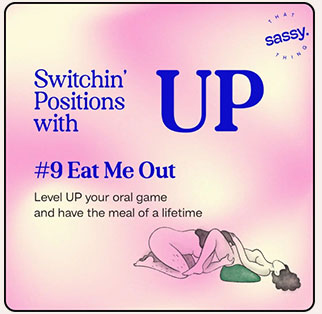Your cart is currently empty

The "body count" question can feel like a social landmine. Whether it pops up during a game of Truth or Dare, a candid chat with your besties about your hoe phases, or during a moment of vulnerability with a new partner, it can make you wonder: “Is this number significant? Is it some kind of badge of honour (or shame)? Does it matter if your tally is 1 or 121?” Think about it from the perspective of gender, and social factors like where you live, and things become more complex. In this post, Aunt Sassy breaks down the conversation on body count and if it matters in the bedroom. Continue reading to know more!

Calculating Your Body Count
One of the biggest signs that the body count conversation is reductive, is that there's an assumption about what counts, which is most often PIV sex. Considering only certain forms of physical touch as part of the equation can downplay the pleasure that can be enjoyed engaging in others. It also excludes people of different sexualities and preferences, and leads to misconceptions about what one’s lover craves in the bedroom. The body count might also not accurately reflect how happening one’s intimate life is. Some people who are in long-term relationships have more sex than those who are single and hooking up, despite being with one person. Furthermore, some people may have had bad experiences with a particular partner, which they might not want to think about when recounting their sexual history.
While it’s natural to think about the body count, it is more exciting to tap into pleasure in a way that goes beyond numbers. Curious about trying something new with boo? Our hand held mini vibrator-Candy is a petite powerhouse with 12 speeds and patterns and an ergonomic finger grip for easy control while you explore each other’s yummy spots!
When Your Identity is Part of the Math
Most people feel the pressure of performance, especially when being sexually liberated is mistakenly associated with frequency of sex. This can lead to trying to rack up the body count to appear more desirable. At the same time, there’s a lot of prejudice that weighs on how one is even allowed to engage in pleasure. Oftentimes in patriarchal societies, it is accepted that men will “sow their wild oats”, while women are slut shamed for indulging in their desires. Stereotypes like, “All bisexual people love threesomes,” can lead to assumptions about how many partners someone has been with. Such misinformation can lead to hesitations and hard feelings around conversations about one’s intimate history.

However, sometimes numbers can give us valuable information. A public health survey conducted in India that studied sexual practices among men and women, interestingly breaks some stereotypes. Women across several states like Assam, Haryana and Kerala, have been with more partners than men in the same parts. Women in rural areas were also seen to have outranked urban women. (Experts state that these statistics might not be completely accurate since the data was self-reported and women can tend to understate how sexually active they’ve been, while men can tend to overstate it, because of societal norms) So while you introspect about what your body count says about you, remember that most judgements that are made about one’s intimate past are rooted in bias and don’t reflect reality.
Gen Influences
Turns out Gen-Z is having less sex than millenials. With more access to resources that equip them with the knowledge of their own sexuality, preferences, and safe pleasure practices, Gen-Z is more firm about their intimate needs and less likely to sacrifice them for the sake of immediate gratification than previous generations. There’s also several socio-economic factors like being overworked, living with parents because of lack of affordable housing, increasing stress and anxiety, and recovering from a pandemic, which reduces the time and opportunities for this generation to invest in their social life. Being aware of how the state of the world influences your intimate life can help better understand why your body count might be at a certain number.

Quality Over Quantity
What ultimately matters regardless of how many people you’ve gotten hot and heavy with, is if you have had a safe experience, which also makes pleasure so much more enjoyable. And the digits in your body count can’t really speak to that. So rather than focusing on a number, it would serve you well to reflect on your intimate history to help identify what your turn on and offs have been, what’s something that makes you feel secure in the bedroom, and what’s something you would like to keep out.
Our water based lube DTF is something that can turn up the comfort and excitement during playtime. Non-sticky and made with the goodness of all-natural ingredients, it makes sure you can slip and slide at ease!
While you might still think about your body count and wonder about others’, your focus should be on creating intimate experiences that leave you feeling satisfied and empowered. Aunt Sassy hopes this piece helps you think about owning your desires in a way that values creating meaningful experiences rather than fixating on numbers. And as always, she wishes you the best of pleasure!
Aunt Sassy tantalizingly hints at her new blog, which delves into the meaning of kink and what is masturbation. This forthcoming exploration promises to offer insights that transcend societal norms, empowering individuals to celebrate their unique sexualities with confidence and joy. Join Aunt Sassy on this journey of discovery, where pleasure knows no bounds and satisfaction lies in the depths of exploration.
By Anna

Anna (she/they) is queer and neurodivergent. They have always been curious about pleasure and conversations around it (and wanted to found a condom company when they were 12, because of Global North misinformed panic that the climate crisis is a consequence of overpopulation–they’ve learnt better now). They wish to contribute to a world where everyone can enjoy access to pleasure, safely and shamelessly.












